Needs of Business by Specifying Graduate Attributes in Australia
VerifiedAdded on 2023/06/04
|8
|1978
|160
Essay
AI Summary
This essay investigates the critical role of graduate attributes in meeting the evolving needs of the Australian business sector. It defines graduate attributes as a comprehensive set of skills, knowledge, and capabilities that students acquire during higher education, emphasizing their importance for employability. The study reviews existing literature to analyze how these attributes are integrated into business education, highlighting the necessity of stakeholder collaboration and the importance of practical skills, critical thinking, and ethical practices. It examines the attributes valued by employers, including communication, teamwork, and adaptability, and explores the challenges universities face in establishing and implementing these competencies, such as lack of institutional support and ineffective teaching strategies. The essay concludes by emphasizing the need for universities to address these challenges to ensure graduates are well-prepared to meet the demands of the business world, advocating for a stronger alignment between curriculum, industry expectations, and student engagement through internships and work-integrated learning.
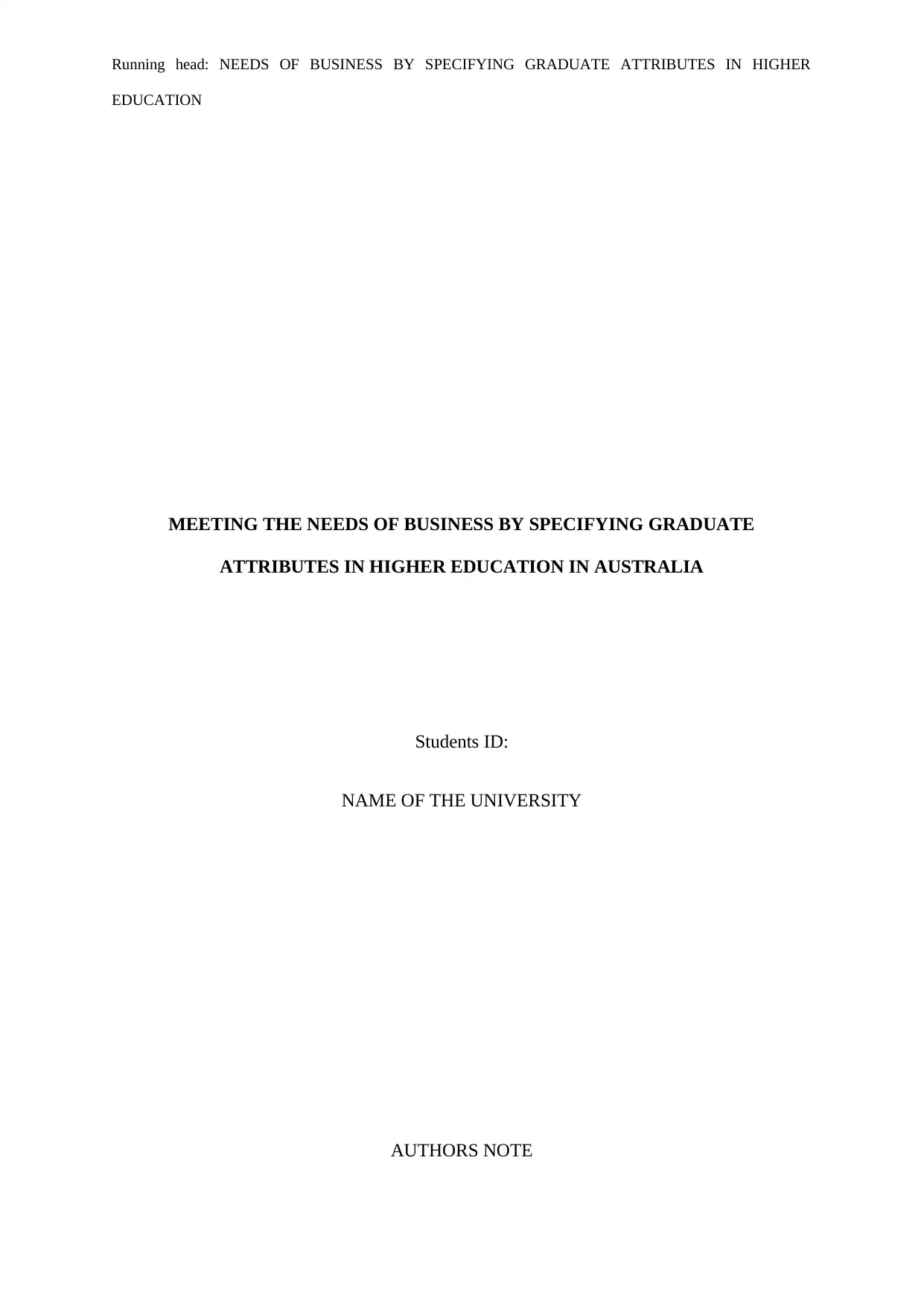
Running head: NEEDS OF BUSINESS BY SPECIFYING GRADUATE ATTRIBUTES IN HIGHER
EDUCATION
MEETING THE NEEDS OF BUSINESS BY SPECIFYING GRADUATE
ATTRIBUTES IN HIGHER EDUCATION IN AUSTRALIA
Students ID:
NAME OF THE UNIVERSITY
AUTHORS NOTE
EDUCATION
MEETING THE NEEDS OF BUSINESS BY SPECIFYING GRADUATE
ATTRIBUTES IN HIGHER EDUCATION IN AUSTRALIA
Students ID:
NAME OF THE UNIVERSITY
AUTHORS NOTE
Paraphrase This Document
Need a fresh take? Get an instant paraphrase of this document with our AI Paraphraser
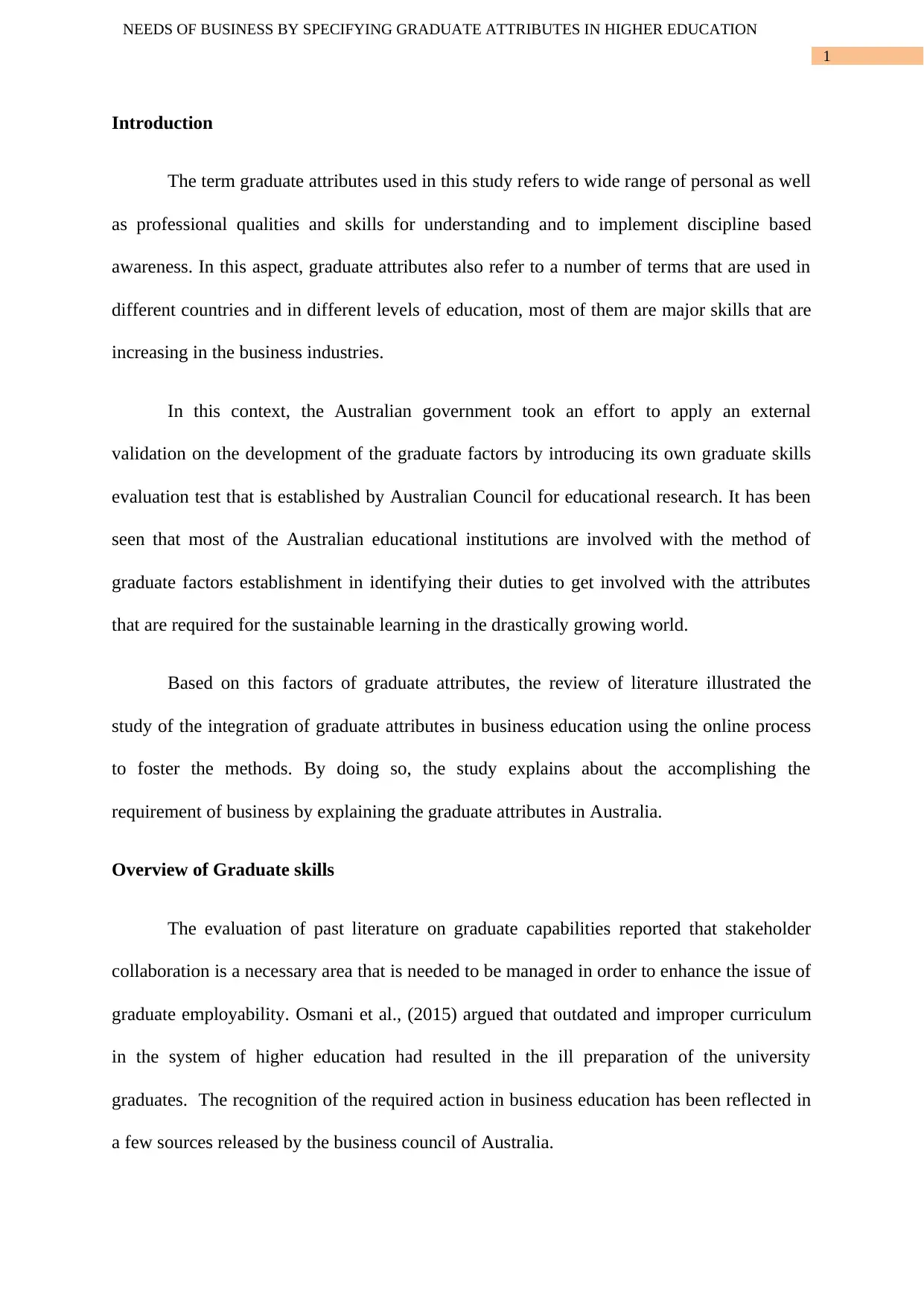
1
NEEDS OF BUSINESS BY SPECIFYING GRADUATE ATTRIBUTES IN HIGHER EDUCATION
Introduction
The term graduate attributes used in this study refers to wide range of personal as well
as professional qualities and skills for understanding and to implement discipline based
awareness. In this aspect, graduate attributes also refer to a number of terms that are used in
different countries and in different levels of education, most of them are major skills that are
increasing in the business industries.
In this context, the Australian government took an effort to apply an external
validation on the development of the graduate factors by introducing its own graduate skills
evaluation test that is established by Australian Council for educational research. It has been
seen that most of the Australian educational institutions are involved with the method of
graduate factors establishment in identifying their duties to get involved with the attributes
that are required for the sustainable learning in the drastically growing world.
Based on this factors of graduate attributes, the review of literature illustrated the
study of the integration of graduate attributes in business education using the online process
to foster the methods. By doing so, the study explains about the accomplishing the
requirement of business by explaining the graduate attributes in Australia.
Overview of Graduate skills
The evaluation of past literature on graduate capabilities reported that stakeholder
collaboration is a necessary area that is needed to be managed in order to enhance the issue of
graduate employability. Osmani et al., (2015) argued that outdated and improper curriculum
in the system of higher education had resulted in the ill preparation of the university
graduates. The recognition of the required action in business education has been reflected in
a few sources released by the business council of Australia.
NEEDS OF BUSINESS BY SPECIFYING GRADUATE ATTRIBUTES IN HIGHER EDUCATION
Introduction
The term graduate attributes used in this study refers to wide range of personal as well
as professional qualities and skills for understanding and to implement discipline based
awareness. In this aspect, graduate attributes also refer to a number of terms that are used in
different countries and in different levels of education, most of them are major skills that are
increasing in the business industries.
In this context, the Australian government took an effort to apply an external
validation on the development of the graduate factors by introducing its own graduate skills
evaluation test that is established by Australian Council for educational research. It has been
seen that most of the Australian educational institutions are involved with the method of
graduate factors establishment in identifying their duties to get involved with the attributes
that are required for the sustainable learning in the drastically growing world.
Based on this factors of graduate attributes, the review of literature illustrated the
study of the integration of graduate attributes in business education using the online process
to foster the methods. By doing so, the study explains about the accomplishing the
requirement of business by explaining the graduate attributes in Australia.
Overview of Graduate skills
The evaluation of past literature on graduate capabilities reported that stakeholder
collaboration is a necessary area that is needed to be managed in order to enhance the issue of
graduate employability. Osmani et al., (2015) argued that outdated and improper curriculum
in the system of higher education had resulted in the ill preparation of the university
graduates. The recognition of the required action in business education has been reflected in
a few sources released by the business council of Australia.
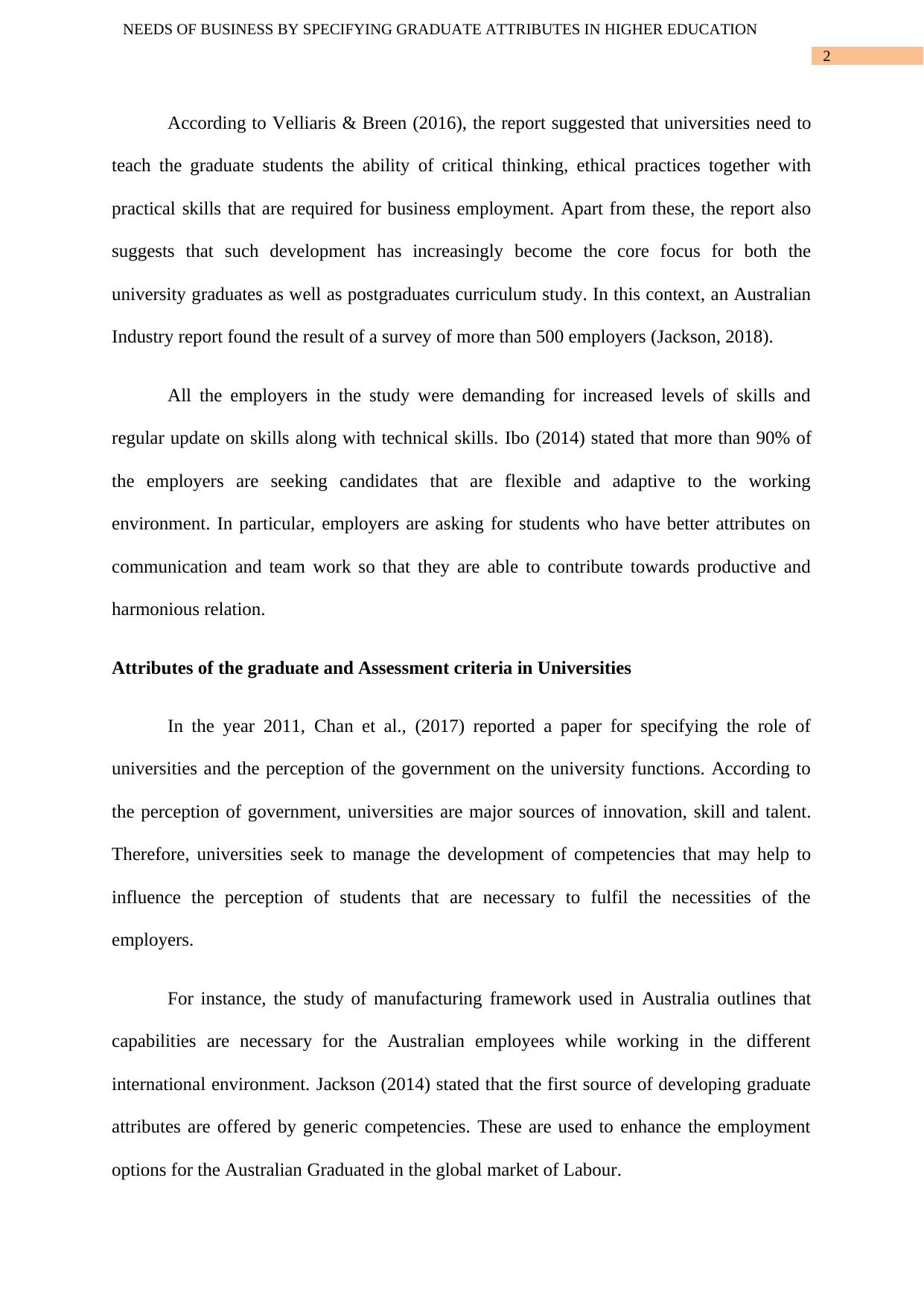
2
NEEDS OF BUSINESS BY SPECIFYING GRADUATE ATTRIBUTES IN HIGHER EDUCATION
According to Velliaris & Breen (2016), the report suggested that universities need to
teach the graduate students the ability of critical thinking, ethical practices together with
practical skills that are required for business employment. Apart from these, the report also
suggests that such development has increasingly become the core focus for both the
university graduates as well as postgraduates curriculum study. In this context, an Australian
Industry report found the result of a survey of more than 500 employers (Jackson, 2018).
All the employers in the study were demanding for increased levels of skills and
regular update on skills along with technical skills. Ibo (2014) stated that more than 90% of
the employers are seeking candidates that are flexible and adaptive to the working
environment. In particular, employers are asking for students who have better attributes on
communication and team work so that they are able to contribute towards productive and
harmonious relation.
Attributes of the graduate and Assessment criteria in Universities
In the year 2011, Chan et al., (2017) reported a paper for specifying the role of
universities and the perception of the government on the university functions. According to
the perception of government, universities are major sources of innovation, skill and talent.
Therefore, universities seek to manage the development of competencies that may help to
influence the perception of students that are necessary to fulfil the necessities of the
employers.
For instance, the study of manufacturing framework used in Australia outlines that
capabilities are necessary for the Australian employees while working in the different
international environment. Jackson (2014) stated that the first source of developing graduate
attributes are offered by generic competencies. These are used to enhance the employment
options for the Australian Graduated in the global market of Labour.
NEEDS OF BUSINESS BY SPECIFYING GRADUATE ATTRIBUTES IN HIGHER EDUCATION
According to Velliaris & Breen (2016), the report suggested that universities need to
teach the graduate students the ability of critical thinking, ethical practices together with
practical skills that are required for business employment. Apart from these, the report also
suggests that such development has increasingly become the core focus for both the
university graduates as well as postgraduates curriculum study. In this context, an Australian
Industry report found the result of a survey of more than 500 employers (Jackson, 2018).
All the employers in the study were demanding for increased levels of skills and
regular update on skills along with technical skills. Ibo (2014) stated that more than 90% of
the employers are seeking candidates that are flexible and adaptive to the working
environment. In particular, employers are asking for students who have better attributes on
communication and team work so that they are able to contribute towards productive and
harmonious relation.
Attributes of the graduate and Assessment criteria in Universities
In the year 2011, Chan et al., (2017) reported a paper for specifying the role of
universities and the perception of the government on the university functions. According to
the perception of government, universities are major sources of innovation, skill and talent.
Therefore, universities seek to manage the development of competencies that may help to
influence the perception of students that are necessary to fulfil the necessities of the
employers.
For instance, the study of manufacturing framework used in Australia outlines that
capabilities are necessary for the Australian employees while working in the different
international environment. Jackson (2014) stated that the first source of developing graduate
attributes are offered by generic competencies. These are used to enhance the employment
options for the Australian Graduated in the global market of Labour.
⊘ This is a preview!⊘
Do you want full access?
Subscribe today to unlock all pages.

Trusted by 1+ million students worldwide
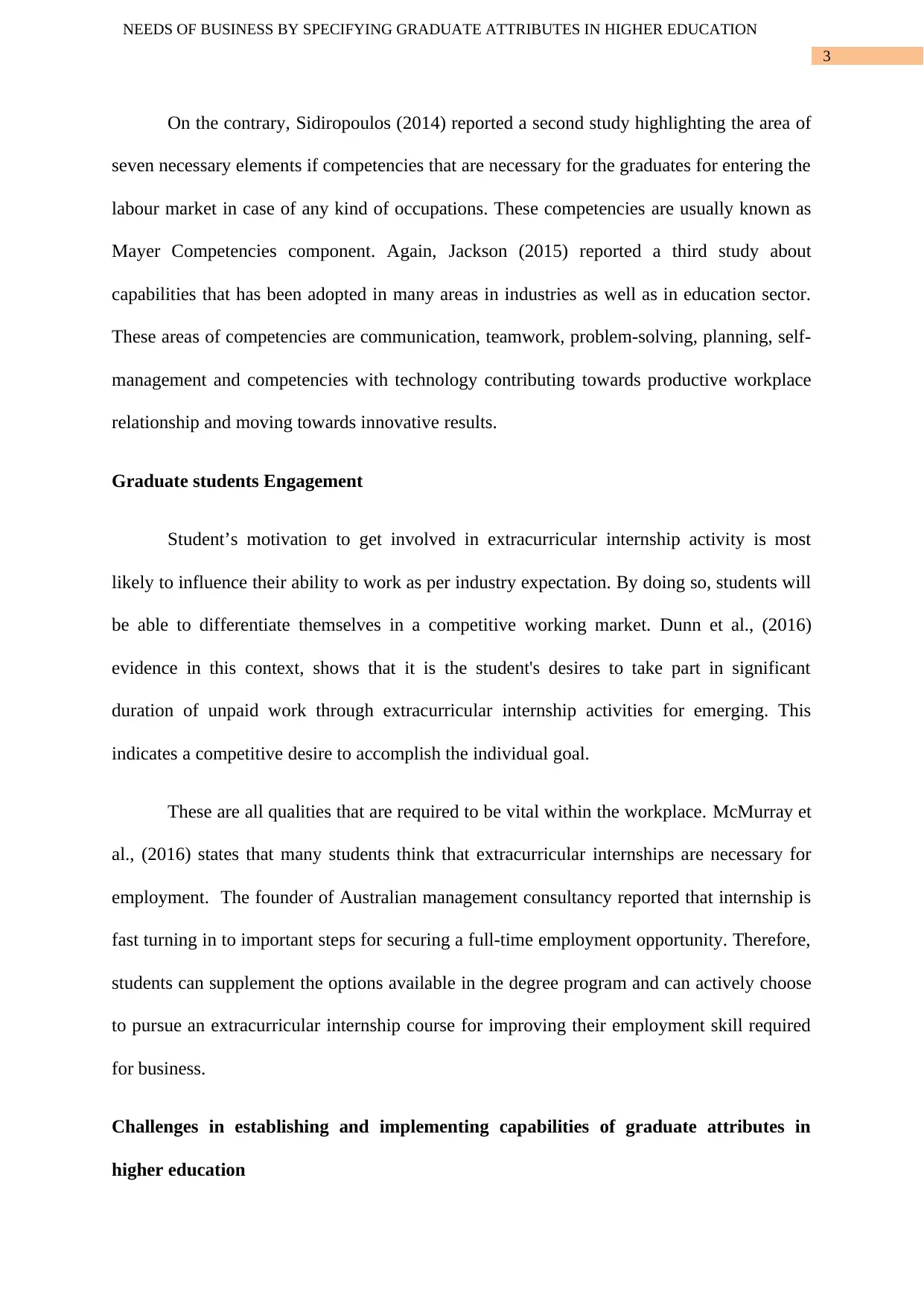
3
NEEDS OF BUSINESS BY SPECIFYING GRADUATE ATTRIBUTES IN HIGHER EDUCATION
On the contrary, Sidiropoulos (2014) reported a second study highlighting the area of
seven necessary elements if competencies that are necessary for the graduates for entering the
labour market in case of any kind of occupations. These competencies are usually known as
Mayer Competencies component. Again, Jackson (2015) reported a third study about
capabilities that has been adopted in many areas in industries as well as in education sector.
These areas of competencies are communication, teamwork, problem-solving, planning, self-
management and competencies with technology contributing towards productive workplace
relationship and moving towards innovative results.
Graduate students Engagement
Student’s motivation to get involved in extracurricular internship activity is most
likely to influence their ability to work as per industry expectation. By doing so, students will
be able to differentiate themselves in a competitive working market. Dunn et al., (2016)
evidence in this context, shows that it is the student's desires to take part in significant
duration of unpaid work through extracurricular internship activities for emerging. This
indicates a competitive desire to accomplish the individual goal.
These are all qualities that are required to be vital within the workplace. McMurray et
al., (2016) states that many students think that extracurricular internships are necessary for
employment. The founder of Australian management consultancy reported that internship is
fast turning in to important steps for securing a full-time employment opportunity. Therefore,
students can supplement the options available in the degree program and can actively choose
to pursue an extracurricular internship course for improving their employment skill required
for business.
Challenges in establishing and implementing capabilities of graduate attributes in
higher education
NEEDS OF BUSINESS BY SPECIFYING GRADUATE ATTRIBUTES IN HIGHER EDUCATION
On the contrary, Sidiropoulos (2014) reported a second study highlighting the area of
seven necessary elements if competencies that are necessary for the graduates for entering the
labour market in case of any kind of occupations. These competencies are usually known as
Mayer Competencies component. Again, Jackson (2015) reported a third study about
capabilities that has been adopted in many areas in industries as well as in education sector.
These areas of competencies are communication, teamwork, problem-solving, planning, self-
management and competencies with technology contributing towards productive workplace
relationship and moving towards innovative results.
Graduate students Engagement
Student’s motivation to get involved in extracurricular internship activity is most
likely to influence their ability to work as per industry expectation. By doing so, students will
be able to differentiate themselves in a competitive working market. Dunn et al., (2016)
evidence in this context, shows that it is the student's desires to take part in significant
duration of unpaid work through extracurricular internship activities for emerging. This
indicates a competitive desire to accomplish the individual goal.
These are all qualities that are required to be vital within the workplace. McMurray et
al., (2016) states that many students think that extracurricular internships are necessary for
employment. The founder of Australian management consultancy reported that internship is
fast turning in to important steps for securing a full-time employment opportunity. Therefore,
students can supplement the options available in the degree program and can actively choose
to pursue an extracurricular internship course for improving their employment skill required
for business.
Challenges in establishing and implementing capabilities of graduate attributes in
higher education
Paraphrase This Document
Need a fresh take? Get an instant paraphrase of this document with our AI Paraphraser
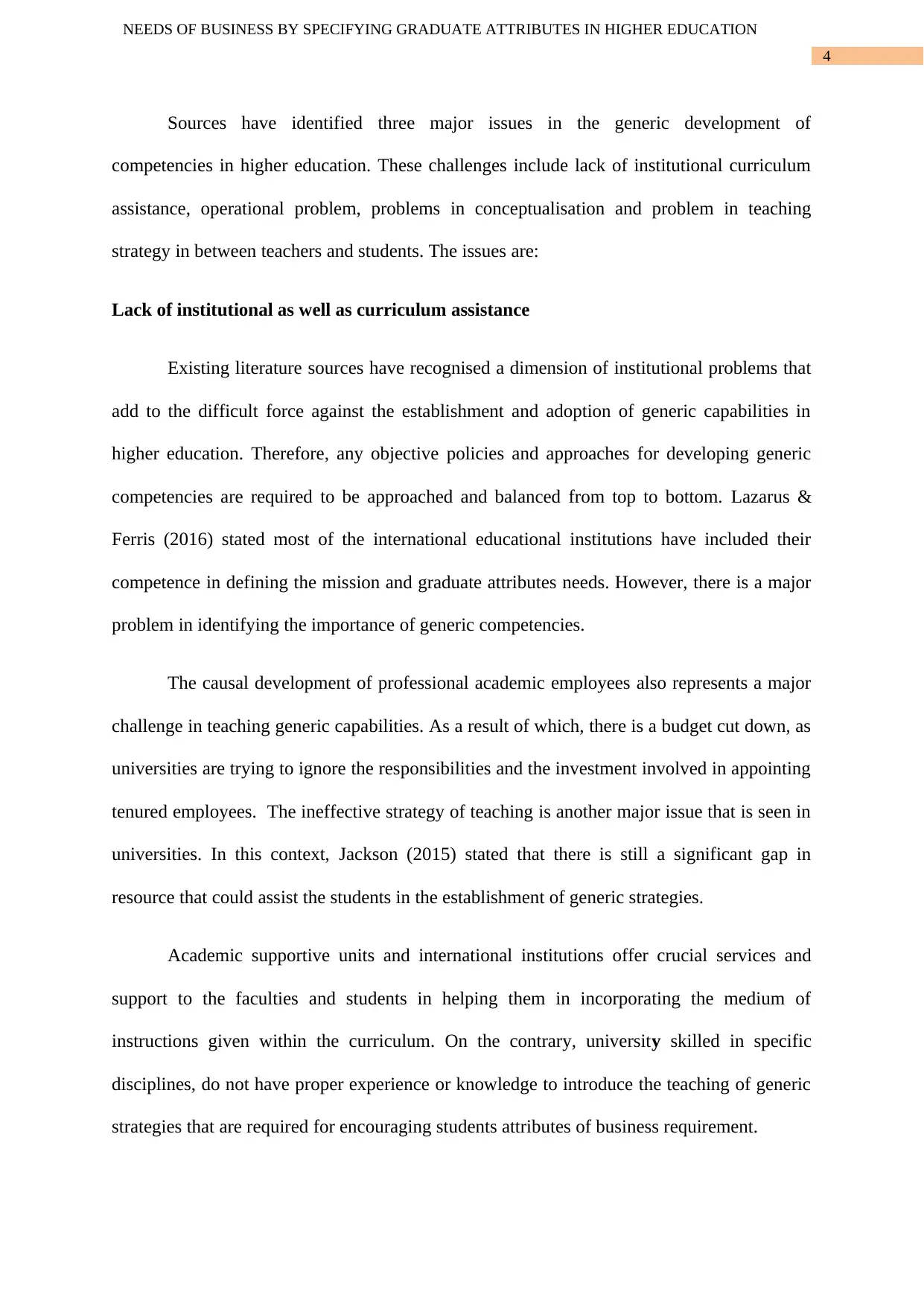
4
NEEDS OF BUSINESS BY SPECIFYING GRADUATE ATTRIBUTES IN HIGHER EDUCATION
Sources have identified three major issues in the generic development of
competencies in higher education. These challenges include lack of institutional curriculum
assistance, operational problem, problems in conceptualisation and problem in teaching
strategy in between teachers and students. The issues are:
Lack of institutional as well as curriculum assistance
Existing literature sources have recognised a dimension of institutional problems that
add to the difficult force against the establishment and adoption of generic capabilities in
higher education. Therefore, any objective policies and approaches for developing generic
competencies are required to be approached and balanced from top to bottom. Lazarus &
Ferris (2016) stated most of the international educational institutions have included their
competence in defining the mission and graduate attributes needs. However, there is a major
problem in identifying the importance of generic competencies.
The causal development of professional academic employees also represents a major
challenge in teaching generic capabilities. As a result of which, there is a budget cut down, as
universities are trying to ignore the responsibilities and the investment involved in appointing
tenured employees. The ineffective strategy of teaching is another major issue that is seen in
universities. In this context, Jackson (2015) stated that there is still a significant gap in
resource that could assist the students in the establishment of generic strategies.
Academic supportive units and international institutions offer crucial services and
support to the faculties and students in helping them in incorporating the medium of
instructions given within the curriculum. On the contrary, university skilled in specific
disciplines, do not have proper experience or knowledge to introduce the teaching of generic
strategies that are required for encouraging students attributes of business requirement.
NEEDS OF BUSINESS BY SPECIFYING GRADUATE ATTRIBUTES IN HIGHER EDUCATION
Sources have identified three major issues in the generic development of
competencies in higher education. These challenges include lack of institutional curriculum
assistance, operational problem, problems in conceptualisation and problem in teaching
strategy in between teachers and students. The issues are:
Lack of institutional as well as curriculum assistance
Existing literature sources have recognised a dimension of institutional problems that
add to the difficult force against the establishment and adoption of generic capabilities in
higher education. Therefore, any objective policies and approaches for developing generic
competencies are required to be approached and balanced from top to bottom. Lazarus &
Ferris (2016) stated most of the international educational institutions have included their
competence in defining the mission and graduate attributes needs. However, there is a major
problem in identifying the importance of generic competencies.
The causal development of professional academic employees also represents a major
challenge in teaching generic capabilities. As a result of which, there is a budget cut down, as
universities are trying to ignore the responsibilities and the investment involved in appointing
tenured employees. The ineffective strategy of teaching is another major issue that is seen in
universities. In this context, Jackson (2015) stated that there is still a significant gap in
resource that could assist the students in the establishment of generic strategies.
Academic supportive units and international institutions offer crucial services and
support to the faculties and students in helping them in incorporating the medium of
instructions given within the curriculum. On the contrary, university skilled in specific
disciplines, do not have proper experience or knowledge to introduce the teaching of generic
strategies that are required for encouraging students attributes of business requirement.
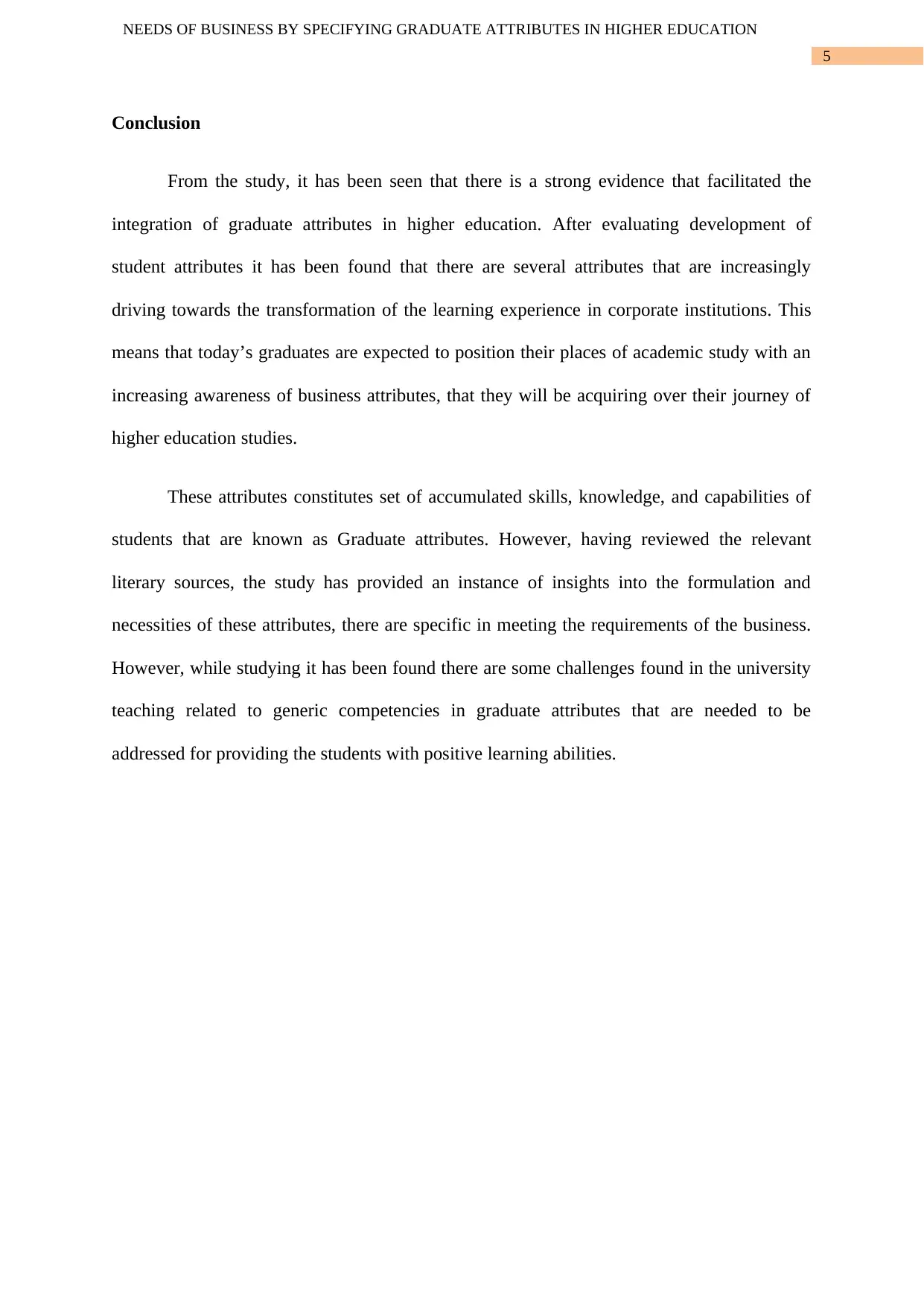
5
NEEDS OF BUSINESS BY SPECIFYING GRADUATE ATTRIBUTES IN HIGHER EDUCATION
Conclusion
From the study, it has been seen that there is a strong evidence that facilitated the
integration of graduate attributes in higher education. After evaluating development of
student attributes it has been found that there are several attributes that are increasingly
driving towards the transformation of the learning experience in corporate institutions. This
means that today’s graduates are expected to position their places of academic study with an
increasing awareness of business attributes, that they will be acquiring over their journey of
higher education studies.
These attributes constitutes set of accumulated skills, knowledge, and capabilities of
students that are known as Graduate attributes. However, having reviewed the relevant
literary sources, the study has provided an instance of insights into the formulation and
necessities of these attributes, there are specific in meeting the requirements of the business.
However, while studying it has been found there are some challenges found in the university
teaching related to generic competencies in graduate attributes that are needed to be
addressed for providing the students with positive learning abilities.
NEEDS OF BUSINESS BY SPECIFYING GRADUATE ATTRIBUTES IN HIGHER EDUCATION
Conclusion
From the study, it has been seen that there is a strong evidence that facilitated the
integration of graduate attributes in higher education. After evaluating development of
student attributes it has been found that there are several attributes that are increasingly
driving towards the transformation of the learning experience in corporate institutions. This
means that today’s graduates are expected to position their places of academic study with an
increasing awareness of business attributes, that they will be acquiring over their journey of
higher education studies.
These attributes constitutes set of accumulated skills, knowledge, and capabilities of
students that are known as Graduate attributes. However, having reviewed the relevant
literary sources, the study has provided an instance of insights into the formulation and
necessities of these attributes, there are specific in meeting the requirements of the business.
However, while studying it has been found there are some challenges found in the university
teaching related to generic competencies in graduate attributes that are needed to be
addressed for providing the students with positive learning abilities.
⊘ This is a preview!⊘
Do you want full access?
Subscribe today to unlock all pages.

Trusted by 1+ million students worldwide
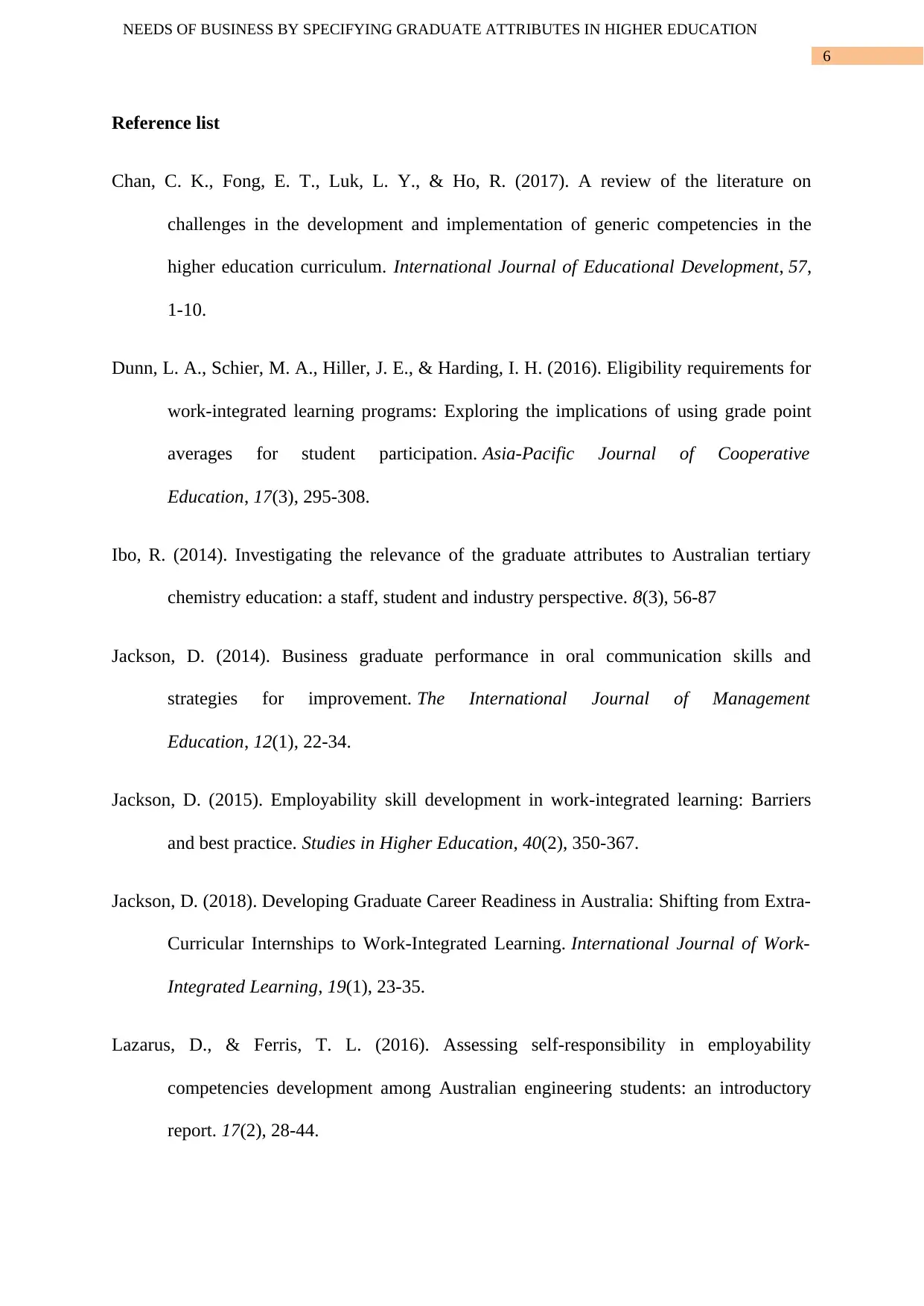
6
NEEDS OF BUSINESS BY SPECIFYING GRADUATE ATTRIBUTES IN HIGHER EDUCATION
Reference list
Chan, C. K., Fong, E. T., Luk, L. Y., & Ho, R. (2017). A review of the literature on
challenges in the development and implementation of generic competencies in the
higher education curriculum. International Journal of Educational Development, 57,
1-10.
Dunn, L. A., Schier, M. A., Hiller, J. E., & Harding, I. H. (2016). Eligibility requirements for
work-integrated learning programs: Exploring the implications of using grade point
averages for student participation. Asia-Pacific Journal of Cooperative
Education, 17(3), 295-308.
Ibo, R. (2014). Investigating the relevance of the graduate attributes to Australian tertiary
chemistry education: a staff, student and industry perspective. 8(3), 56-87
Jackson, D. (2014). Business graduate performance in oral communication skills and
strategies for improvement. The International Journal of Management
Education, 12(1), 22-34.
Jackson, D. (2015). Employability skill development in work-integrated learning: Barriers
and best practice. Studies in Higher Education, 40(2), 350-367.
Jackson, D. (2018). Developing Graduate Career Readiness in Australia: Shifting from Extra-
Curricular Internships to Work-Integrated Learning. International Journal of Work-
Integrated Learning, 19(1), 23-35.
Lazarus, D., & Ferris, T. L. (2016). Assessing self-responsibility in employability
competencies development among Australian engineering students: an introductory
report. 17(2), 28-44.
NEEDS OF BUSINESS BY SPECIFYING GRADUATE ATTRIBUTES IN HIGHER EDUCATION
Reference list
Chan, C. K., Fong, E. T., Luk, L. Y., & Ho, R. (2017). A review of the literature on
challenges in the development and implementation of generic competencies in the
higher education curriculum. International Journal of Educational Development, 57,
1-10.
Dunn, L. A., Schier, M. A., Hiller, J. E., & Harding, I. H. (2016). Eligibility requirements for
work-integrated learning programs: Exploring the implications of using grade point
averages for student participation. Asia-Pacific Journal of Cooperative
Education, 17(3), 295-308.
Ibo, R. (2014). Investigating the relevance of the graduate attributes to Australian tertiary
chemistry education: a staff, student and industry perspective. 8(3), 56-87
Jackson, D. (2014). Business graduate performance in oral communication skills and
strategies for improvement. The International Journal of Management
Education, 12(1), 22-34.
Jackson, D. (2015). Employability skill development in work-integrated learning: Barriers
and best practice. Studies in Higher Education, 40(2), 350-367.
Jackson, D. (2018). Developing Graduate Career Readiness in Australia: Shifting from Extra-
Curricular Internships to Work-Integrated Learning. International Journal of Work-
Integrated Learning, 19(1), 23-35.
Lazarus, D., & Ferris, T. L. (2016). Assessing self-responsibility in employability
competencies development among Australian engineering students: an introductory
report. 17(2), 28-44.
Paraphrase This Document
Need a fresh take? Get an instant paraphrase of this document with our AI Paraphraser
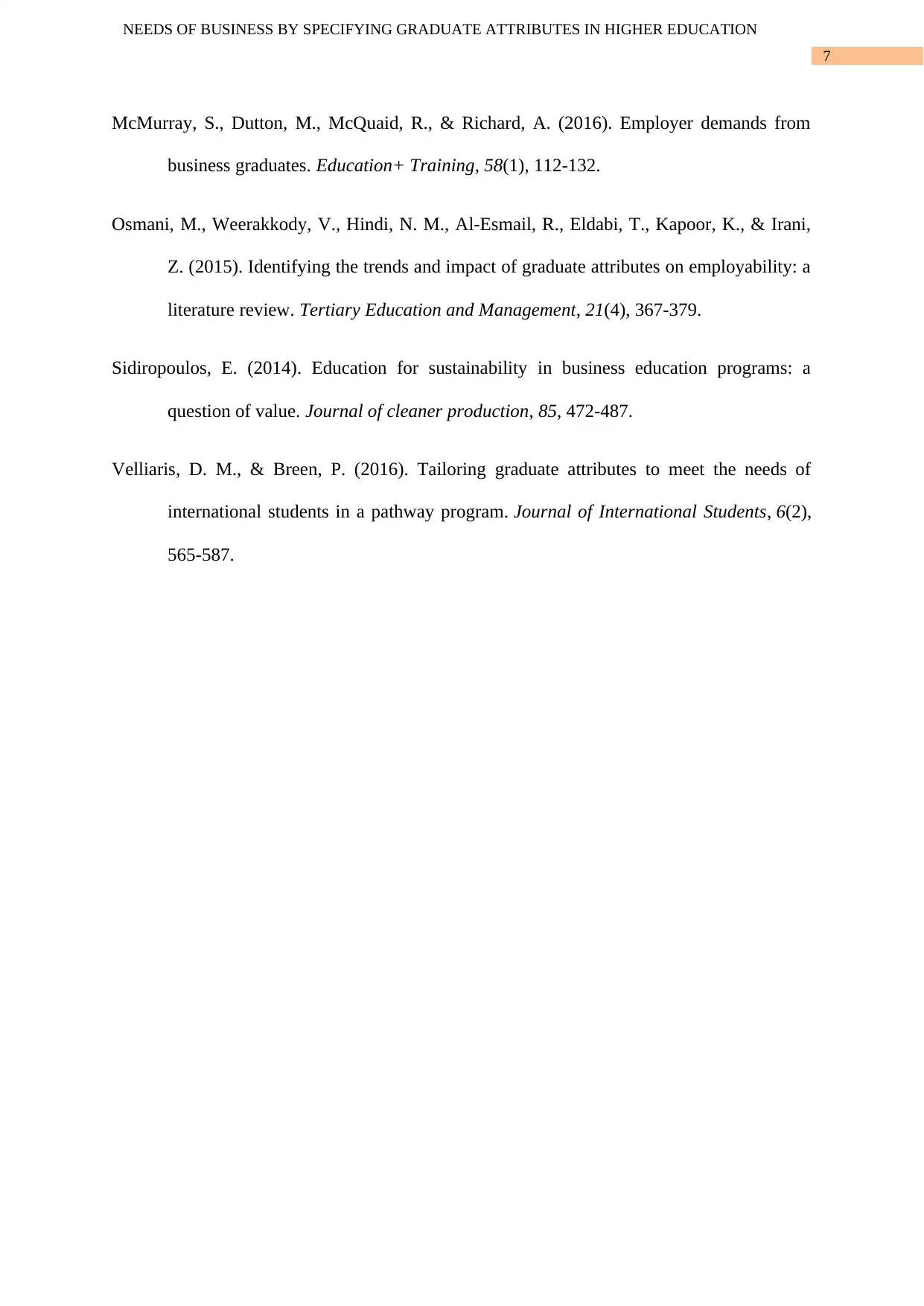
7
NEEDS OF BUSINESS BY SPECIFYING GRADUATE ATTRIBUTES IN HIGHER EDUCATION
McMurray, S., Dutton, M., McQuaid, R., & Richard, A. (2016). Employer demands from
business graduates. Education+ Training, 58(1), 112-132.
Osmani, M., Weerakkody, V., Hindi, N. M., Al‐Esmail, R., Eldabi, T., Kapoor, K., & Irani,
Z. (2015). Identifying the trends and impact of graduate attributes on employability: a
literature review. Tertiary Education and Management, 21(4), 367-379.
Sidiropoulos, E. (2014). Education for sustainability in business education programs: a
question of value. Journal of cleaner production, 85, 472-487.
Velliaris, D. M., & Breen, P. (2016). Tailoring graduate attributes to meet the needs of
international students in a pathway program. Journal of International Students, 6(2),
565-587.
NEEDS OF BUSINESS BY SPECIFYING GRADUATE ATTRIBUTES IN HIGHER EDUCATION
McMurray, S., Dutton, M., McQuaid, R., & Richard, A. (2016). Employer demands from
business graduates. Education+ Training, 58(1), 112-132.
Osmani, M., Weerakkody, V., Hindi, N. M., Al‐Esmail, R., Eldabi, T., Kapoor, K., & Irani,
Z. (2015). Identifying the trends and impact of graduate attributes on employability: a
literature review. Tertiary Education and Management, 21(4), 367-379.
Sidiropoulos, E. (2014). Education for sustainability in business education programs: a
question of value. Journal of cleaner production, 85, 472-487.
Velliaris, D. M., & Breen, P. (2016). Tailoring graduate attributes to meet the needs of
international students in a pathway program. Journal of International Students, 6(2),
565-587.
1 out of 8
Related Documents
Your All-in-One AI-Powered Toolkit for Academic Success.
+13062052269
info@desklib.com
Available 24*7 on WhatsApp / Email
![[object Object]](/_next/static/media/star-bottom.7253800d.svg)
Unlock your academic potential
Copyright © 2020–2026 A2Z Services. All Rights Reserved. Developed and managed by ZUCOL.





